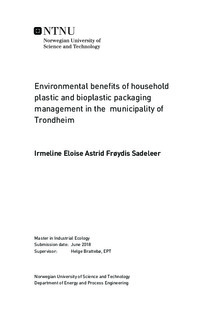Environmental benefits of household plastic and bioplastic packaging management in the municipality of Trondheim
Abstract
Plastic waste is currently at the core of European and Norwegian public debate. On May 22, 2018, the Member States of the European Union (EU) and the European Parliament approved a set of ambitious measures as part of EU s circular economy policy. These measures were based on the Commission's proposals for implementing the circular economy package presented in December 2015, which is considered an important tool for combating climate change and resource depletion. The target of 50% plastic packaging recycling was among others adopted.
With the objective of increasing recycling rates, the municipality of Trondheim considers building a central sorting (CS) facility. However, the environmental impacts from such a CS facility has not been investigated in a holistic perspective. What are the environmental impacts of a waste management system where plastic waste is sorted out from the residual waste in a central sorting facility compared to a system where the fraction is sorted out at the household level? In addition, bioplastics have been presented as a sustainable alternative to conventional petroleum-based plastics and are increasingly becoming a part of the plastic market. Nevertheless, bioplastics have lower recyclability their conventional counterparts. How does a share of bioplastics affect the life cycle emissions of household plastic consumption? In an attempt to answer these two research questions, which both fill a knowledge gap in the literature, a life cycle assessment (LCA) based on material flow analysis (MFA) principles was developed.
The environmental burdens related to global warming potential (GWP), fossil depletion potential (FDP), freshwater ecotoxicity potential (FETP), human toxicity potential (HTP), natural land transformation potential (LTP) and terrestrial acidification potential (TAP) were found to be lower when plastics are sorted out in a CS facility than when sorted out in households. This primarily occurs with the elimination of individual packing and sorting processes and with decreased amounts of incinerated plastics. However, this conclusion becomes less evident when the amounts of recycled materials increase with higher out-sorting rates. In fact, impacts in the categories FETP, HTP and LTP are increased given the influence of the recycling process on these impact categories.
Higher recycling rates hence lead to diminished impacts in regard to GWP, FDP and TAP but induce higher environmental stress in regard to HTP, FETP and LTP. The plastic recycling rates were found to double when sorting the fraction out in a CS facility, but the target set by the EU was only reached in an ideal scenario.
Further, this analysis disclosed that the life cycle impacts of household plastic consumption are reduced importantly for freshwater ecotoxicity and slightly reduced for global warming and fossil depletion potentials when bioplastics are introduced. Nonetheless, all other impact categories experience increases in impacts, mirroring the high environmental stress caused by the bioplastic production process.
For mitigating climate change and resource depletion, it was found to be more effective to improve the plastic waste out-sorting system than to promote the production and use of bioplastics as alternative to petroleum-based plastics.
